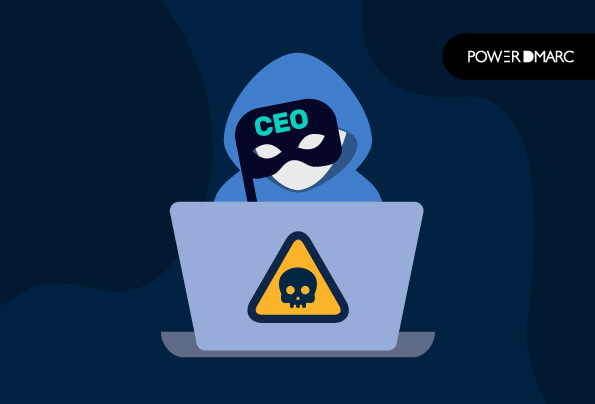Email serves as a critical channel for B2B lead generation and customer communications, but it is also one of the most widely targeted channels for cyberattacks and email fraud scams. Cybercriminals are always innovating their attacks in order to steal more information and financial assets. As organizations continue to fight back with stronger security measures, cybercriminals must constantly evolve their tactics and improve their phishing and spoofing techniques.
In 2024, a drastic increase in the use of machine learning (ML) and artificial intelligence (AI) based phishing attacks that are going undetected by traditional email security solutions have been detected by security researchers from around the world. The main aim of these attacks are to manipulate human behaviour and trick people into performing unauthorized actions – like transferring money to fraudsters’ accounts.
While the threat of email-based attacks and email fraud are always evolving, don’t stay behind. Know the email fraud trends that will take place in the following years in terms of fraudster tactics, tools, and malware. Through this blog post I’ll show you how cybercriminals are developing their tactics, and explain how your business can prevent this kind of email attack from taking place.
Types Of Email Fraud Scams to Beware of in 2024
1. Business Email Compromise (BEC)
COVID-19 has compelled organizations to implement remote-working environments and shift to virtual communication between employees, partners, and customers. While this has a few benefits to list down, the most apparent downside is the alarming rise in BEC over the past year. BEC is a broader term used for referring to email fraud attacks like email spoofing and phishing.
The common idea is that a cyber attacker uses your domain name to send emails to your partners, customers, or employees trying to steal corporate credentials to gain access to confidential assets or initiate wire transfers. BEC has affected more than 70% of organizations over the past year and has led to the loss of billions of dollars worth of company assets.
2. Evolved Email Phishing Attacks
Email phishing attacks have drastically evolved in the past few years although the motive has remained the same, it is the medium to manipulate your trusted partners, employees and clients into clicking on malicious links encapsulated within an email that appears to be sent from you, in order to initiate the installation of malware or credential theft. Evolved email scammers are sending phishing emails that are hard to detect. From writing impeccable subject lines and error-free content to creating fake landing pages with a high level of accuracy, manually tracing their activities have become increasingly difficult in 2024.
3. Man-In-The-Middle
Gone are the days when attackers sent out poorly-written emails that even a layman could identify as fraudulent. Threat actors these days are taking advantage of SMTP security problems like the use of opportunistic encryption in email transactions between two communicating email servers, by eavesdropping on the conversation after successfully rolling back the secured connection to an unencrypted one. MITM attacks like SMTP downgrade and DNS spoofing have been increasingly gaining popularity in 2024.
4. CEO Fraud
CEO fraud refers to the schemes that are being conducted that target high-level executives in order to gain access to confidential information. Attackers do this by taking the identities of actual people such as CEOs or CFOs and sending a message to people at lower levels within the organization, partners and clients, tricking them into giving away sensitive information. This type of attack is also called Business Email Compromise or whaling. In a business setting, some criminals are venturing to create a more believable email, by impersonating the decision-makers of an organization. This allows them to ask for easy money transfers or sensitive information about the company.
5. COVID-19 Vaccine Lures
Security researchers have unveiled that hackers are still trying to capitalize on the fears tied to the COVID-19 pandemic. Recent studies shed light on the cybercriminal mindset, revealing a continued interest in the state of panic surrounding the COVID-19 pandemic and a measurable uptick in phishing and business email compromise (BEC) attacks targeting company leaders. The medium for perpetrating these attacks is a fake COVID-19 vaccine lure that instantly raises interest among email receivers.
How Can You Enhance Email Security?
- Configure your domain with email authentication standards like SPF, DKIM and DMARC
- Shift from DMARC monitoring to DMARC enforcement to gain maximum protection against BEC, CEO fraud and evolved phishing attacks
- Consistently monitor email flow and authentication results from time to time
- Make encryption mandatory in SMTP with MTA-STS to mitigate MITM attacks
- Get regular notifications on email delivery issues with details on their root causes with SMTP TLS reporting (TLS-RPT)
- Mitigate SPF permerror by staying under the 10 DNS lookup limit at all times
- Help your recipients visually identify your brand in their inboxes with BIMI
PowerDMARC is your single email authentication SaaS platform that assembles all email authentication protocols like SPF, DKIM, MTA-STS, TLS-RPT and BIMI on a single pane of glass. Sign up today to get your free DMARC analyzer!
- Rise in Tax Scams and IRS Email Impersonation Attacks During Tax Season - May 2, 2024
- Email Safety 101 to Fight Crypto Scams - April 30, 2024
- How to Find the Best DMARC Solution Provider for Your Business? - April 25, 2024
